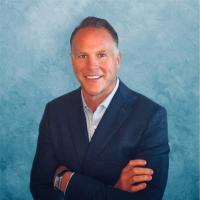
Christopher Roy, Bachelor of Science in Economics, 1992. Chris is a native of Columbus and was a football scholarship athlete at OSU. Afterwards, he joined a company that eventually merged with AT&T. He was involved in the acquisition of several communication and cellular companies into AT&T, making it one of the largest public companies in the country. He retired as a Vice President at AT&T in 2021 and now works in a private equity capacity; he currently lives in Dallas.
Q. Why did you choose to study economics at Ohio State?
Back in 1988 when I enrolled, students didn’t necessarily apply to a given major at admission which is more typical in today’s enrollment process; many of us just started in “General Studies.” I was originally a journalism major with an interest in political science. When I took a microeconomics class as an elective, I got an “A”, and really enjoyed it, the concepts really “clicked” with me. So I took macroeconomics as a combination elective with the same result, and I began to see its applications in the business world as well as other parts of the world. That led to my choosing it as a major.
Q. How has the economics you studied at Ohio State helped you in your career?
It gave me a foundational knowledge and reasoning that I use every day in the business world, without even necessarily recognizing it as economics. Its applications are universal, so you can think about nearly everything in that context. It is also an important complement to other disciplines or types of expertise within a company.
Q, In your current position, what do you do on a day-to-day basis that utilize the principles you learned in Economics?
This has changed over the course of my career. Early on it was mostly client-facing work that employed financial economic modeling to demonstrate the value of a project or service to the client. As I moved into executive positions, the fundamentals are used as key performance indicators to gauge the vitality and direction of the practice I oversaw. In my current private equity role, I regularly have to evaluate the performance, potential and progress of the companies we are investing in versus the rest of the market.
Q. What is the most challenging work experience you've encountered so far?
Integration work is typically the most difficult. I call it “where strategy meets operational reality”. At one point, I was responsible for the network integration of companies we acquired into the ATT business. Acquisitions like Warner Media involved 3 separate divisions, each with different business cultures that took an extraordinary amount of work to align. Merging cultures doesn’t happen overnight – it can take quite a while and a lot of effort to manage those dynamics. It was much more complex than simply implementing an integration plan built in the strategy room. It requires constant modifications of an operational plan and the coordination to land that plan at the original targeted financial point regardless of the modifications.
Q. What is your next big career goal?
In general my roles have involved either setting strategy or implementing it, but not really both. One of these days I’d like to take a project from the concept stage to full actualization – I think that it would be very satisfying to do so.
Q. Do you have any regrets from your time at OSU?
Actually, none whatsoever. I’m mainly grateful that early in my days that I was forced to take electives, which led to my discovering and then pursuing economics in my career.
Q. Do you have any parting thoughts and/or advice for current economics students?
Be open minded to acquiring other skillsets outside your field of intended study as well, either in school or early in your career. I have found that those with economics training paired with other disciplines are often the “glue” within a company. They tend to be able to see the broader panoply of a business, that is, to appreciate and support how different aspects of a business contribute to the success of the company.
